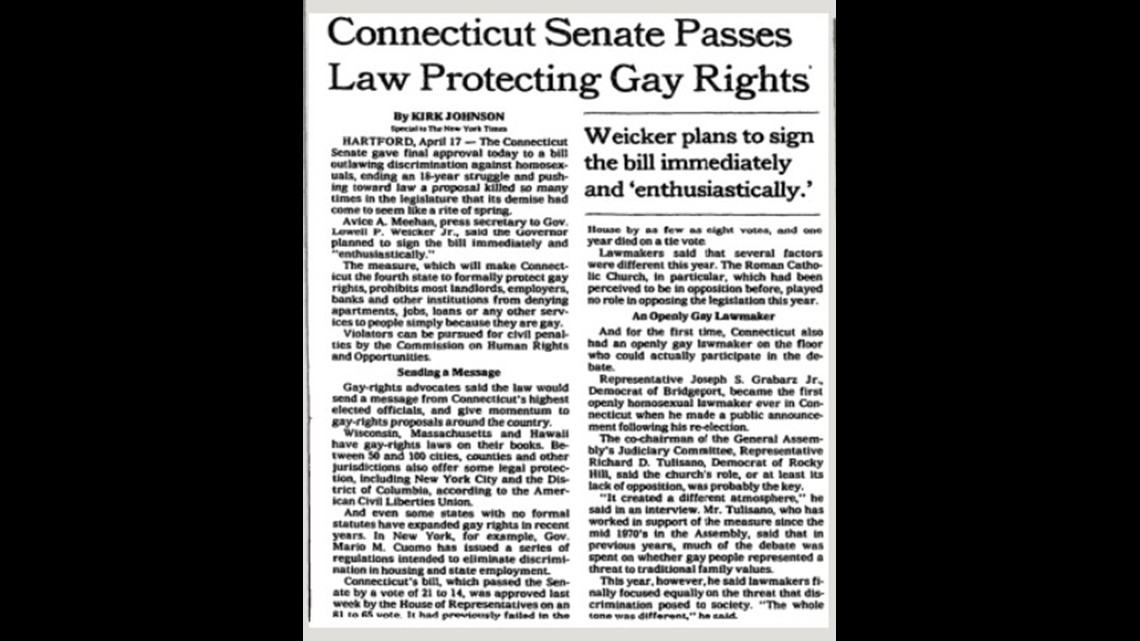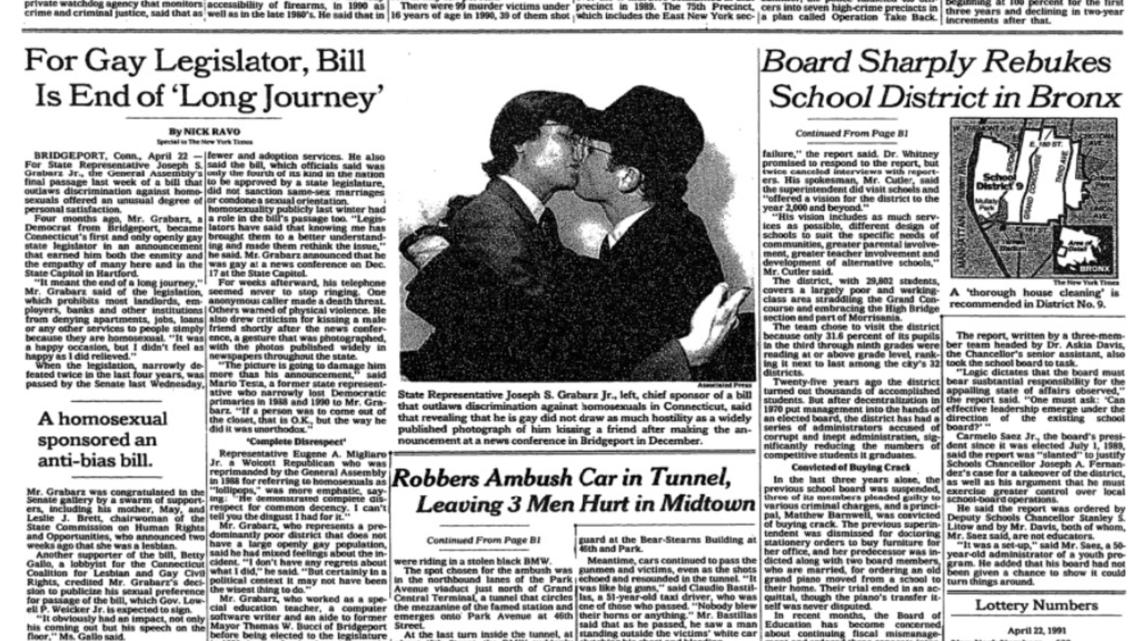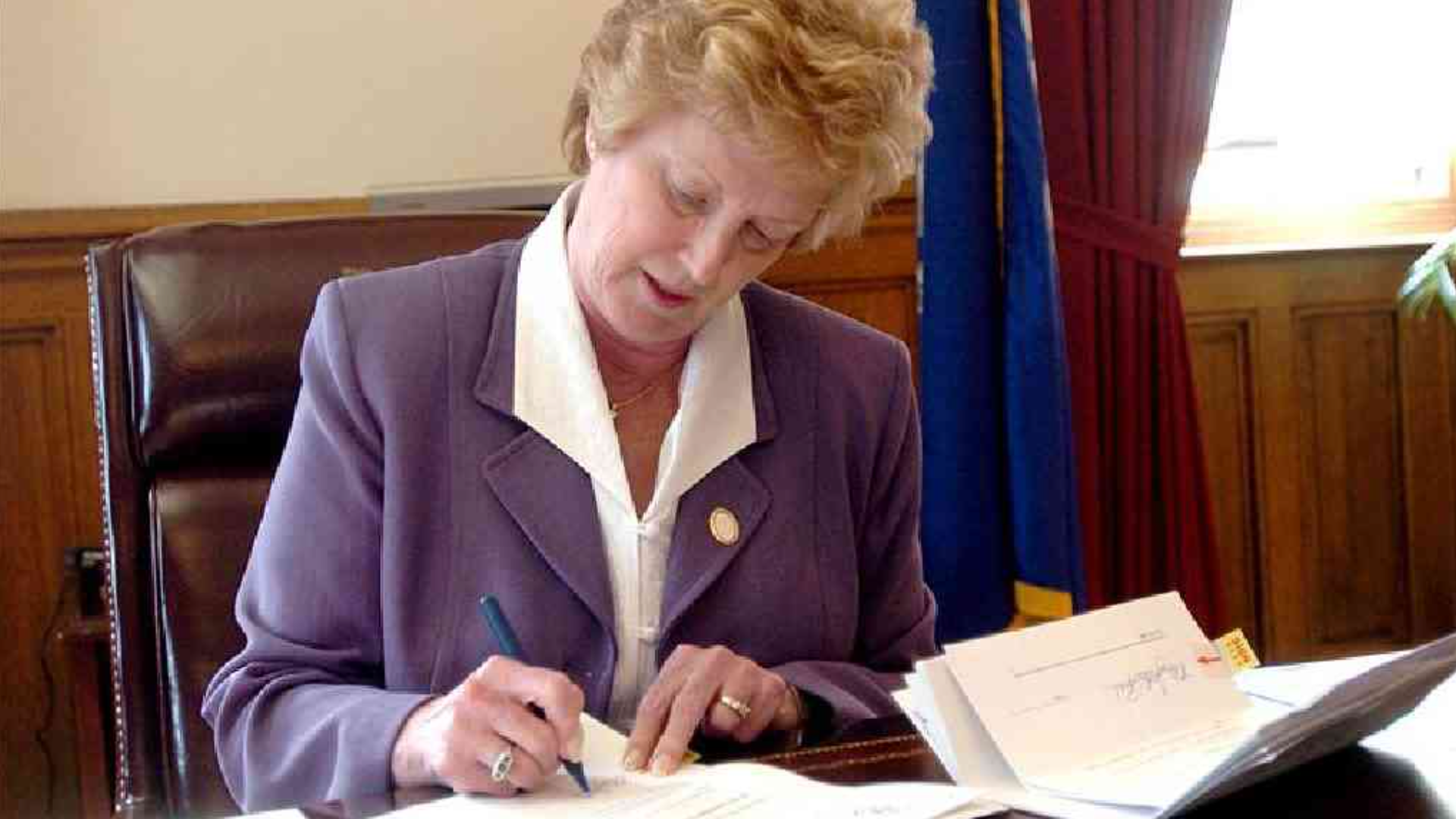HARTFORD, Conn. — Connecticut’s LGBTQ+ residents enjoy a wide variety of legal protections, and most are not aware of the state’s leadership in the fight for their rights.
While the state may not have been the first, Connecticut was one of the earliest states to pass many LGBTQ+ protections.
Here is a timeline of the state's LGBTQ+ history:
1600s-1960s
It wasn't always this way. Several men were put to death for having sex with other men in the early days of the Connecticut colony. The legislature eventually removed the death penalty in the 1800s.
Legal experts point to the landmark Griswold v. Connecticut case which allowed married couples to buy and use contraception without government interference in the 1960s as setting the stage for the state to become involved in legal issues regarding privacy.
Jennifer Brown, dean of the Quinnipiac University School of Law, said: "I think there were a number of things that combined to help Connecticut move more quickly in this area. One was that Connecticut has had a history in state constitutional law of giving greater protections for equal protection than other states have, that is to say, the equal protection clause of our Constitution has been applied and enforced more rigorously."
1975
The fight for LGBTQ+ rights started in earnest in 1975, six years after the Stonewall riots in New York City when the legislation that would ensure equal rights protections for lesbians and gay men was first proposed by Betty Hudson, a Democratic legislator from Madison.
According to the state’s archives, “In 1975, Hudson introduced a bill guaranteeing equal rights to gay people. The Senate passed the bill, making it the first state legislative chamber to pass such a bill in the United States. However, it did not pass in the House.”
Hudson died in 2016, a year after the U.S. Supreme Court ruled same-sex marriages legal in Obergefell v. Hodges. The first state to pass similar legislation was Wisconsin in 1982.
1990s
Eight years later, Mike Lawlor, currently Associate Professor of Criminal Justice at University of New Haven, was serving his second term in the General Assembly. He remembered demonstrators calling for passage of the lesbian and gay civil rights bill shouting and unfurling a banner from the gallery during then Gov. Bill O’Neill’s State of the State speech in 1990.
"I didn't know they did that stuff here," said Lawlor, who wasn’t out at the time. "At that moment, none of the laws that we take for granted today were in fact the law. Back then you could fire someone for being gay, evict them from their apartment. And as confrontational as that scene was, it's evidence that sometimes you really have to get in people's faces to get them to acknowledge that there's really a problem there. And fortunately, in the ensuing years, you didn't have to resort to that kind of behavior. It seemed like we would never get to the point where we are today."
The death of Richard Riehl, a gay man who was killed in Wethersfield by two teens in 1988, was one of the events that spurred the Connecticut legislature to pass some of the first hate crime laws in the nation in 1990.
About a year later, then Gov. Lowell Weicker signed legislation making Connecticut the third state in the country to legalize comprehensive protections for lesbians and gay men against discrimination in housing, employment, and public accommodation. It was thirty years before the same protections for transgender people were made legal.


At the time, there was only one state legislator who was out of the closet. State Rep. Joe Grabarz, who was famously photographed kissing his ex-boyfriend after the press conference where he announced he was gay.


A court decision handed down in 1999 by the State Supreme Court effectively said the state had no way to allow an unmarried person to adopt a child with the child's biological parent. It left the matter up to the legislature to resolve.
Anne Stanback and several others formed Love Makes a Family, an organization to advocate for a law that would allow unmarried people to jointly adopt their partner's child.
In 2000, the state passed a law that would allow those adoptions. Around the same time, Stanback worked to make Love Makes a Family into a formal organization charged with advocating for rights for the LGBT community.
Lawlor said he feels the second parent adoption bill was the turning point in retrospect. Lawlor said gay and lesbian couples meeting and talking to legislators, organized by Love Makes a Family, broke down barriers and stereotypes and those changes in perception had a long-lasting impact.
Brown said: "We were able to see other states' experience with it. It turns out the sky does not fall, the world continues to turn. And I think we were able to see that up close and more personal here in Connecticut."
1999 - 2008
Shortly after Vermont instituted civil unions in 1999, members of the lesbian and gay community starting the call for official recognition of same-sex marriage. Civil union laws conferred the same rights to same-sex couples as marriage did for heterosexual couples. Essentially, a marriage in everything but the name.
Love Makes a Family pushed for civil unions initially in Connecticut. At the same time, the Massachusetts Supreme Judicial Court ruled in Goodridge v. Massachusetts that same-sex couples should be allowed to marry in November 2003 and that Civil Unions were not a viable remedy. The ruling led to the first marriages in that state six months later in May 2004.
Stanback remembers the day the Massachusetts decision came down.
"We had had a press conference to share some polling data at the Capitol. And it just so happened that minutes before we were to start, Massachusetts Supreme Court had handed down their marriage decision," she said.
As Stanback started the press conference, the room broke out in sustained cheers and applause for several minutes. "And so we had to sort of on the fly, shift things around, but that was really exciting to be, you know, sharing this, this polling data that was so supportive of marriage, just as this, historic event was happening."
Watch unedited footage from Northampton Massachusetts on the first day same-sex marriage was legal there.
Dr. Mary Bernstein, a professor of sociology at UConn, said the ruling redefined civil unions, not a stepping stone to marriage, but as something legally inferior to marriage. Love Makes a Family used that argument to shift from advocating for civil unions to pushing for same-sex marriage - which was controversial at the time.
"We felt like it did not make sense for us to be pushing for civil unions when we really were there for marriage," Stanback said, "Many of us felt like civil union was insulting, it was a second class at status. It provided all the state rights and protections of marriage. But it did not allow us to then move on to get the federal rights of marriage. But strategically, if we had supported civil unions, our board of directors felt like it... would have been very hard for us to come back with our electoral work, and oppose legislators who supported civil union, simply as a way to take marriage off the table, and unopposed marriage."
Bernstein said: "When something happens like that, it shows that things are possible and all of sudden, for activists that care about this issue or people who never were activists, but for whom marriage was very meaningful, all of a sudden they can get on board with this issue."
"I think one of the consequences, the positive consequences of taking the stand to push as hard as we could for as long as we could for marriage, was that finally for the first time, not just legislators, but also our own community and the public at large began to understand, oh, there is a difference in civil union and marriage. said Stanback. "Obviously, the critical rights and protections that come with marriage were very important and are very important. But heterosexual couples don't get married, you know, to get the right to file an absentee ballot for their spouse, they do it because they fall in love, and they want to share, and I have this commitment and have it publicly. And that's why same-sex couples choose to marry as well. And so we began talking much more about family and commitment and love."
Bernstein said the opposition in Connecticut was never as strong as other states. She said The Family Institute, which was formed in opposition to Love Makes a Family, was looked on by legislators as being somewhat extremist. That position, said Bernstein, made legislators less likely to want to be associated with the opposing group.
Stanback said one of the most effective strategies Love Makes a Family used was to enlist faith organizations, child welfare organizations, and labor groups. "I think by the time we got to marriage, we had so many more straight allies who wanted to be involved."
Then Gov. Jodi Rell, a Republican, indicated that she would sign same-sex civil union legislation, but not same-sex marriage. The General Assembly voted for a bill that would allow civil unions and sent it to Rell, who signed it in 2005. That made Connecticut the first state to pass same-sex union legislation in the country without the courts ordering it to do so.
As couples entered into Civil Unions in the state, Kerrigan v. Commissioner of Public Health was working its way through the courts. The plaintiffs argued that Civil Unions were, in effect, separate and unequal.
After a long deliberation period, in October 2008, the State Supreme Court ruled civil unions were discriminatory and ordered the state to issue marriage licenses to same-sex couples. Connecticut became the second state to legalize same-sex marriage after Massachusetts.
“All of those court decisions you know, supporters and just refreshing the computer and finally getting the decision and having people frantically reading through to the, to the line at the end. That's just sort of a surreal moment," said Stanback.
Love Makes a Family had organized a rally at the State Capitol. “It was just so amazing to be up there and to look out at the sea of, and just really excited people who felt like their, their state and their government was working for them. I'll never forget that,” said Stanback.
Lawlor said, "We were... the first state to pass a marriage equality law through the legislature and ironically in both cases those bills were signed into law by a Republican governor. That is something that has never been acknowledged in the national history of this movement."
2008 - present
In June 2013, the U.S. Supreme Court declared same-sex married couples were being discriminated against by the Federal Government. Two years later, the high court ruled that same-sex marriages should be allowed around the country.
In 2011, the legislature passed and Gov. Dan Malloy signed legislation that extended civil rights protections against discrimination based on gender identity and expression. In 2015 legislation made it legal for anyone born in the state to change their gender markers on state-issued documents. Malloy also signed into a law a ban on conversion therapy and issued executive order protecting transgender students.
And in 2019, Gov. Ned Lamont outlawed the 'panic defense' in criminal cases where defendants said the victim's orientation or gender expression caused the defendants to panic and commit the crime. The state has also led efforts to allow student athletes to compete in sports competition under their affirmed gender.
This while other states have passed anti-transgender legislation.
"Part of it is the tradition in our state legislature. There is very strong and deeply planted bipartisan roots," said Lawlor when asked about why it happened in Connecticut and not other states. "We have very open-ended public hearings and open-ended debates here and that's the tradition and I think that kind of helps get people together and actually talk to one another."
Lawlor continued: "Today everyone takes these rights for granted, at the time it was pretty controversial. But as each year went by.. the bipartisan support, the public opinion support jelled in our state, and that's one of the main reasons I love the fact that I live in Connecticut."
"I just really want to give a huge shout out to the lawyers and the litigants, you know, who stuck with this, the legislators the lobbyists who stuck with it and told the stories, and, and tried to change hearts and minds, even when there were losses and setbacks because they had, you know, they did have their eyes on a prize," Brown said.
In 2022, Erick Russell was elected Connecticut State Treasurer, becoming the first openly gay African American elected to a statewide office in the United States.
What's Next?
Bernstein sees the next battle looming in the area of protection for LGBTQ+ youth who are on their own after being thrown out of their homes or leaving on their own.
"They're not necessarily as easily solvable by a law," she said.
Stanback said: "I think that the fight for transgender rights is still not over. I think there are certain gay and lesbian and bisexual people who would say that our fight for dignity and respect isn't over either. But I think we, we have a lot more work to do when it comes to having the public understand the challenge that transgender people face, and, you know, we are seeing that right now with the issue of transgender athletes."
Brown said she feels the same.
"I think we're talking much more about transgender rights, and what we think we're talking about when we talk about gender, and what it means to be masculine or feminine, or to be a man or a woman, gender identity and expression, gender fluidity, is I think, now much more, much more a part of people's conversation," she said. "I think we're still figuring out what some of the legal implications will be. But that, to me, seems to be where much of the attention is being placed right now.
It's endlessly interesting complex, it challenges us had very deep levels, even to think about these fundamental aspects of our identity. But I, I hope that people continue to be open to think about that. And, and again, you know, this isn't so much a legal approach to it. Maybe it's more a kind of religious or spiritual approach. But law and spirituality are not always at odds."
HERE ARE MORE WAYS TO GET FOX61 NEWS
Download the FOX61 News APP
iTunes: Click here to download
Google Play: Click here to download
Stream Live on ROKU: Add the channel from the ROKU store or by searching FOX61.


